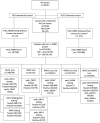Advances in genetic technologies result in improved diagnosis of mismatch repair deficiency in colorectal and endometrial cancers
- PMID: 33452216
- PMCID: PMC8961751
- DOI: 10.1136/jmedgenet-2020-107542
Advances in genetic technologies result in improved diagnosis of mismatch repair deficiency in colorectal and endometrial cancers
Abstract
Background: Testing cancers for mismatch repair deficiency (dMMR) by immunohistochemistry (IHC) is a quick and inexpensive means of triaging individuals for germline Lynch syndrome testing. The aim of this study was to evaluate tumour dMMR and the prevalence of Lynch syndrome in patients referred to the Manchester Centre for Genomic Medicine, which serves a population of 5.6 million.
Methods: Tumour testing used IHC for MMR proteins with targeted BRAF and MLH1 promotor methylation testing followed by germline mutation and somatic testing as appropriate.
Results: In total, 3694 index tumours were tested by IHC (2204 colorectal cancers (CRCs), 739 endometrial cancers (ECs) and 761 other), of which 672/3694 (18.2%) had protein loss, including 348 (9.4%) with MLH1 loss. MLH1 loss was significantly higher for 739 ECs (15%) vs 2204 CRCs (10%) (p=0.0003) and was explained entirely by higher rates of somatic MLH1 promoter hypermethylation (87% vs 41%, p<0.0001). Overall, 65/134 (48.5%) patients with MLH1 loss and no MLH1 hypermethylation or BRAF c.1799T>A had constitutional MLH1 pathogenic variants. Of 456 patients with tumours showing loss of MSH2/MSH6, 216 (47.3%) had germline pathogenic variants in either gene. Isolated PMS2 loss was most suggestive of a germline MMR variant in 19/26 (73%). Of those with no germline pathogenic variant, somatic testing identified likely causal variants in 34/48 (71%) with MLH1 loss and in MSH2/MSH6 in 40/47 (85%) with MSH2/MSH6 loss.
Conclusions: Reflex testing of EC/CRC leads to uncertain diagnoses in many individuals with dMMR following IHC but without germline pathogenic variants or MLH1 hypermethylation. Tumour mutation testing is effective at decreasing this by identifying somatic dMMR in >75% of cases.
Keywords: genetic predisposition to disease; genetic testing; surgical oncology.
© Author(s) (or their employer(s)) 2022. Re-use permitted under CC BY. Published by BMJ.
Conflict of interest statement
Competing interests: None declared.
Figures

References
-
- Jiang W, Cai M-Y, Li S-Y, Bei J-X, Wang F, Hampel H, Ling Y-H, Frayling IM, Sinicrope FA, Rodriguez-Bigas MA, Dignam JJ, Kerr DJ, Rosell R, Mao M, Li J-B, Guo Y-M, Wu X-Y, Kong L-H, Tang J-H, Wu X-D, Li C-F, Chen J-R, Ou Q-J, Ye M-Z, Guo F-M, Han P, Wang Q-W, Wan D-S, Li L, Xu R-H, Pan Z-Z, Ding P-R, XD W, CF L, QJ O, RH X, Written on behalf of AME Colorectal Cancer Cooperative Group . Universal screening for Lynch syndrome in a large consecutive cohort of Chinese colorectal cancer patients: high prevalence and unique molecular features. Int J Cancer 2019;144:2161–8. 10.1002/ijc.32044 - DOI - PubMed
Publication types
MeSH terms
Substances
Supplementary concepts
Grants and funding
LinkOut - more resources
Full Text Sources
Other Literature Sources
Medical
Research Materials
Miscellaneous
